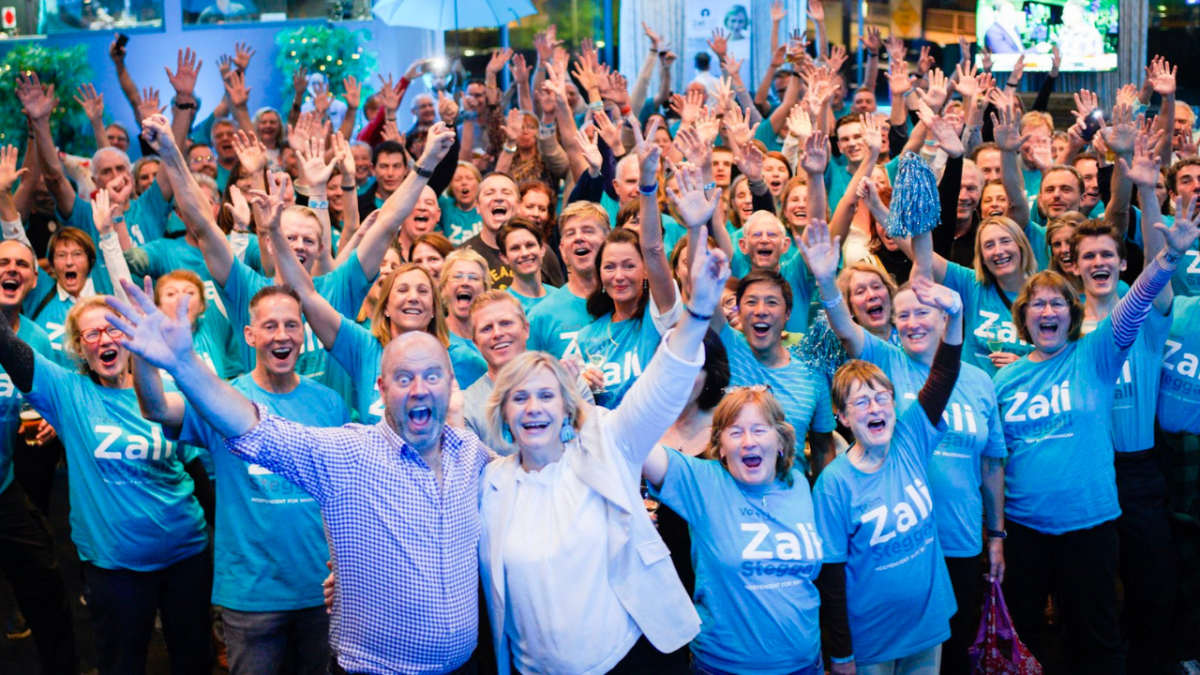
Every election, ballot sheets are riddled with independent candidates. But at the 2022 federal election there was a new category of people who pushed to win our vote: teal independents. So who were these teal people and how did they manage to unseat so many big-wig Liberals like former treasurer Josh Frydenberg & Tim Wilson?
To put it simply – the so-called “teal independents” were independent political candidates focused primarily on climate issues. They were backed by one of the biggest political donation reserves in Australian history — the Climate 200 fund.
That sounds like a good thing, right? Healthy for democracy and all that jazz.
Let’s get a few things straight.
What was the goal of the teal independents?
To unseat Coalition politicians who had been slack on climate action such as Tim Wilson in Goldstein, former Treasurer Josh Frydenberg in Kooyong and former Minister for Energy and Emissions Reduction Angus Taylor in Hume.
The strategy marked a departure from the tactics of groups like GetUp! which failed to unseat extremely conservative Liberals such as Peter Dutton at the 2019 federal election.
This time, the focus was on unseating more moderate, inner-city Liberals.
Where are the teal independents based?
At the 2022 federal election there were 22 teal independents running for seats across Australia.
Seven of these teal independents won their seats.
The winners were:
Allegra Spender in Wentworth NSW, Dr Monique Ryan in Kooyong Vic, Kate Chaney in Curtin WA, Zoe Daniel in Goldstein Vic, Kylea Tink in North Sydney NSW, Sophie Scamps in Mackellar NSW and finally Zali Steggall who retained her seat in Warringah NSW.
Watching women stand up for their communities and WIN!!! Big love from Warringah!
So many amazing campaigns. Some successful, some not (this time!). But all having a huge impact.#IndependentsDay #ausvotes #EnoughisEnough pic.twitter.com/DCJe7eEbKr
— 🌏 Zali Steggall MP (@zalisteggall) May 21, 2022
How were they funded?
The teal candidates were funded through a massive political war chest convened by the son of Australia’s first billionaire – Simon Holmes à Court. The funding pool received donations from philanthropists, business people and many everyday Australians.
The Climate 200 fund was established prior to the 2019 Federal election. It supported Zali Steggall who famously unseated ex-PM Tony Abbot in Warringah and went on to win again this time around.
While the total amount remains unknown, The Age reported the fund contained $4.6 million in December.
Who supported the teal independents?
Heaps of people. The teals managed to pull off a set of massive victories across the nation.
Probably the biggest upset of the night was Dr Monique Ryan’s win in the blue ribbon seat of Kooyong where the libs have won every election since federation. Lol.
In addition to voter support, numerous political players put thrown their voices (and their cash) behind them.
Ex-Liberal PM Malcolm Turnbull said the movement was “very healthy” and “clearly a lot of traditional Liberal party voters feel the party has moved way off to the right on a bunch of issues, in particular on climate,” as per Guardian Australia.
On the other side of politics, the Sydney Morning Herald reported the Greens’ all-time top donor Graeme Wood abandoned the party to pledge his dollars to teal independents.
Who are the teal independents?
While there are many Climate 200 backed independents, here’s a bit of goss on a few of the big winners from election day 2022.
Dr Monique Ryan won against the federal treasurer Josh Frydenberg in Kooyong, Victoria.
Before running for parliament, Dr Ryan was the director of the neurology department at the Royal Children’s Hospital Melbourne.
.@JoshFrydenberg has never crossed the floor.
Mr Frydenberg has voted against real climate action and against a federal anti-corruption commission.
If you always vote with Barnaby Joyce, you’re not a moderate.#auspol #mon4kooyong #kooyongvotes pic.twitter.com/PKn2LWcG1s
— Dr Monique Ryan MP (@Mon4Kooyong) May 6, 2022
Allegra Spender beat Dave Sharma in Wentworth, NSW.
Prior to running for office, Spender worked as a policy analyst in the UK’s treasury department and in the private sector for her family’s fashion business.
I’m running as an independent because the next ten years are crucial for the environment, the economy, and integrity in politics. And I’m running because I know we can do so much better. #WentworthVotes pic.twitter.com/d76dGBVui9
— Allegra Spender (@spenderallegra) January 26, 2022
Former ABC reporter Zoe Daniel thumped Tim Wilson in Goldstein, Victoria.
During her journalism career she was the ABC’s correspondent in Southeast Asia and Washington DC.
Finally the election has been called, and the same isn’t safe. Let’s make history together and make change for a generation. If not us who, if not now, when? #GoldsteinVotes #ZoeForGoldstein #FindYourVoice pic.twitter.com/ZONivlpMcy
— Zoe Daniel (@zdaniel) April 10, 2022
Why did people vote for the teal independents?
If you lived in a Liberal-held seat and hated it there, you probably saw the teal independents as your best bet to change things up.
Thank you for the love, Goldstein.
To my team, volunteers, and supporters. We learnt to fly this plane while it was in the air. Thanks to you, we touched down.
I’ll be forever grateful for your support.
📷: Bernard Wright pic.twitter.com/qH1nTJwH2Z
— Zoe Daniel (@zdaniel) May 23, 2022
Most teal independents wanted to provide voters with an alternative to heel-dragging Liberal MPs.
They knew that historically, the seats they were targeting were (generally) filled with voters who were socially and environmentally progressive (yay LGBT+ rights and solar panels) but economically conservative (yay franking credits and owning 11 houses).
The teals were never claiming to be as progressive as a Greens candidate but they also weren’t as terminally conservative as the Liberal candidates. This political middle-ground was an attractive prospect for many voters in seats that ended up flipping to teal.
In the end over 1,200 volunteers helped turn Wentworth teal. It was the largest political movement our community has ever seen. This is Australian democracy at its healthiest. I thank our community for this wonderful victory – your values will be front and centre in all I do.
— Allegra Spender (@spenderallegra) May 23, 2022
What will the teal independents do now they’ve been elected?
While the teal independents are all supported by the Climate 200 fund, they are still independents. This means it’s not a one-size-fits-all sitch in terms of policy. However, there are a few common themes.
All teal independents want more action on climate change. Many also want increased government accountability through a federal Independent Commission Against Corruption (ICAC).
If there’s a hung parliament (where no major party forms a majority government) – they could have lots of power to influence legislation and leverage their climate priorities.
If Labor ends up forming a majority government the teal independents will have next to zero sway in the House of Representatives. This was the reality for OG teal independent Zali Steggall during the Morrison era.
Our community campaign began because we wanted real action on climate change.
With 2,000 volunteers and 3,000 donors, we knocked on 55,000 doors and distributed 4,000 corflutes.
We did politics differently and we changed the government.#auspol #Mon4Kooyong #KooyongVotes pic.twitter.com/rzeTeiY9ov
— Dr Monique Ryan MP (@Mon4Kooyong) May 22, 2022
Teal independents sound like a good thing, are they really?
While climate action is an important issue for many Aussies, we must acknowledge these candidates ran on climate as their primary talking point.
That is mainly because voters in these Liberal-held electorates were (in large part) socially and environmentally progressive but economically conservative.
Therefore the teal independents who won their races most likely wouldn’t support sweeping changes to the tax system or drastic funding spikes to public education. BUT I guess it ain’t a perfect world out there.
At the end of the day, Climate 200 candidates helped knock off unhelpful slugs like Josh Frydenberg, Dave Sharma, Tim Wilson & Trent Zimmerman.
So at the very least we don’t have to hear those now-defeated libs yabber on in parliament anymore. Bless.



